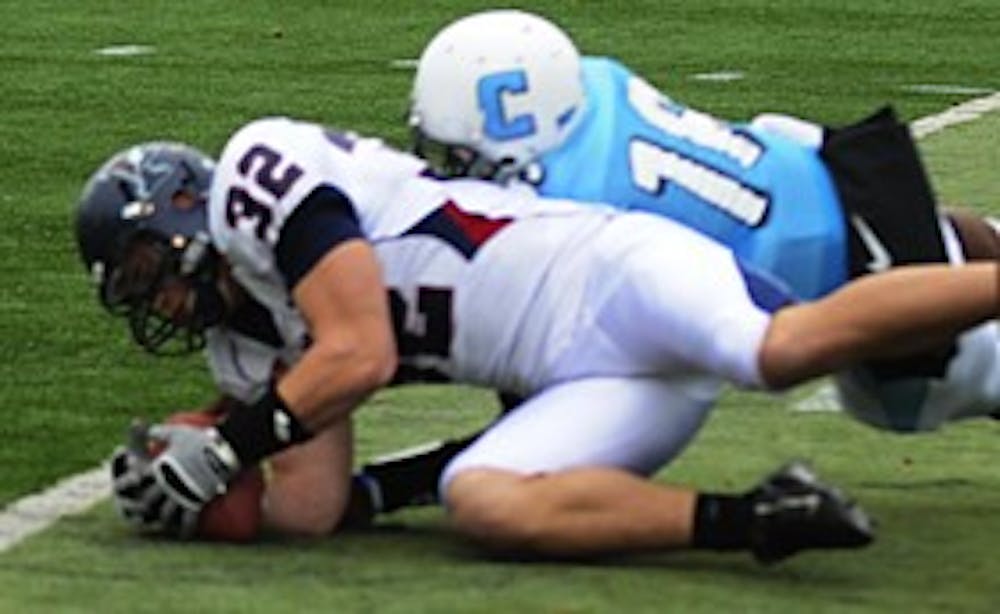
NEW YORK — With just over eight minutes left in the fourth quarter, Columbia faced a critical fourth and sixth from the Penn 16.
Down 11 points, it made sense for the Lions to kick the 33-yard field goal and then hope their defense could stop the Quakers’ offense.
Instead, coach Norries Wilson decided to go for it. Personally I didn’t think it was the wisest decision. But then again the Columbia kicker already had an extra point blocked, so clearly Wilson didn’t have a lot of faith in his kicking unit.
On the ensuing play, Lions’ quarterback M.A. Olawale was hit right as he released the ball, and Penn linebacker Erik Rask picked it off. It was Olawale’s fifth turnover of the game.
Yet the Lions weren’t completely done. They forced a three and out with just over 5:30 left and receiver Austin Knowlin lined up to receive the Penn punt.
But then Knowlin caught the turnover bug and fumbled away the ball — and the game. In the postgame press conference, he was adamant that he didn’t touch the ball nor had a fair chance to catch it, but the damage was already done.
Just two out of 120 total plays, these two critical turnovers epitomized the Lions’ loss. And that’s exactly what this game was — a Lions’ loss, rather than a Quakers’ win.
* * *
After the game, Coach Wilson knew exactly why his team didn’t earn its first win over the Quakers in 13 tries.
“w Not many football teams are going to win games when you turn the ball over seven times,” he lamented.
It’s telling that Wilson used the first person singular to refer to the team. Clearly he felt he was personally responsible for the loss, and even for the actual turnovers.
“Well, let’s see. I snapped the ball through the quarterback’s legs and I didn’t run and cover it — I don’t think Penn forced that one. I think it’s a function of not having attention to detail.”
* * *
Penn’s defense deserves credit for forcing seven turnovers; it was a key part of the game plan after all.
“All week, our main goal was to try and get some turnovers,” Rask said. “That’s what we did. … And we did a great job.”
Penn coach Al Bagnoli was quick to add that the Lions entered the game first in the Ivy League with a plus-eight turnover margin, having thrown zero picks while having lost just two fumbles.
But sitting in the stands with the Penn Band, I couldn’t help noticing how sloppy the game was. Penn wasn’t without fault, as it had three turnovers in the first half and also missed (yet another) field goal.
Frankly, with a stretch of three-straight drives in the first quarter ending in picks, it seemed like both teams were more than willing to give away the game early on.
Eventually Penn settled down and didn’t turn the ball over after halftime. But without the Columbia turnovers, the Quakers would’ve had a tough time winning this game.
For example, while they didn’t give up any points after halftime, they only scored six of their own. Also, with 17 of the team’s 27 points coming off turnovers, they were heavily reliant on the Lions’ mistakes to generate their own offense.
So how important was the Quakers’ plus-four turnover margin in the win?
“It was critical,” Bagnoli said.
Actually, it was more than just critical. It was the reason Penn won.
Zach Klitzman is a senior history major from Bethesda, Md., and is Sports Editor of The Daily Pennsylvanian. His e-mail address is klitzman@dailypennsylvanian.com. Senior Staff Writer David Gurian-Peck contributed reporting to this column.
The Daily Pennsylvanian is an independent, student-run newspaper. Please consider making a donation to support the coverage that shapes the University. Your generosity ensures a future of strong journalism at Penn.
DonatePlease note All comments are eligible for publication in The Daily Pennsylvanian.




